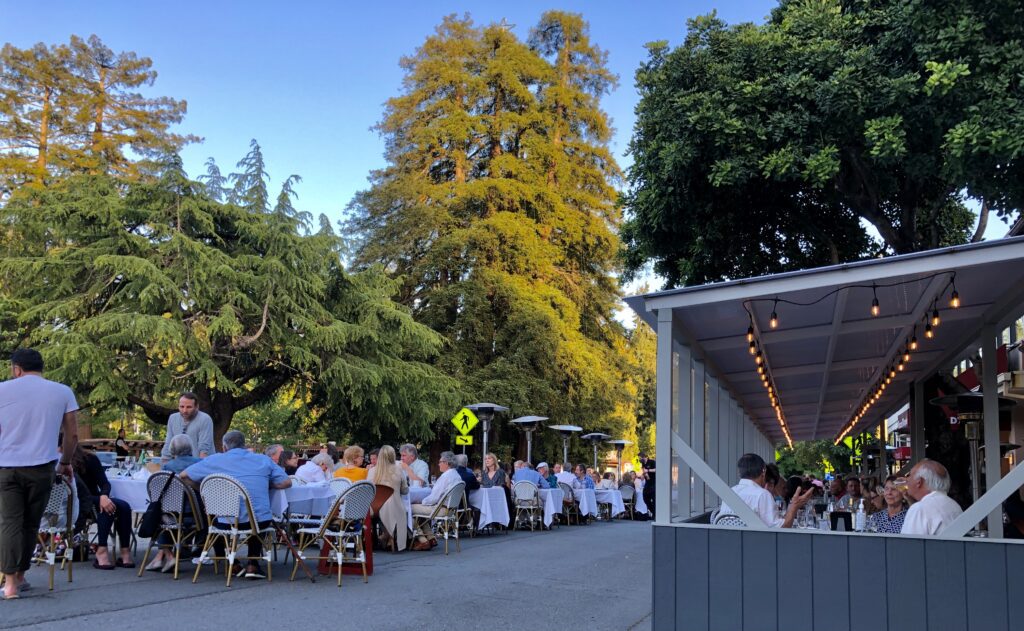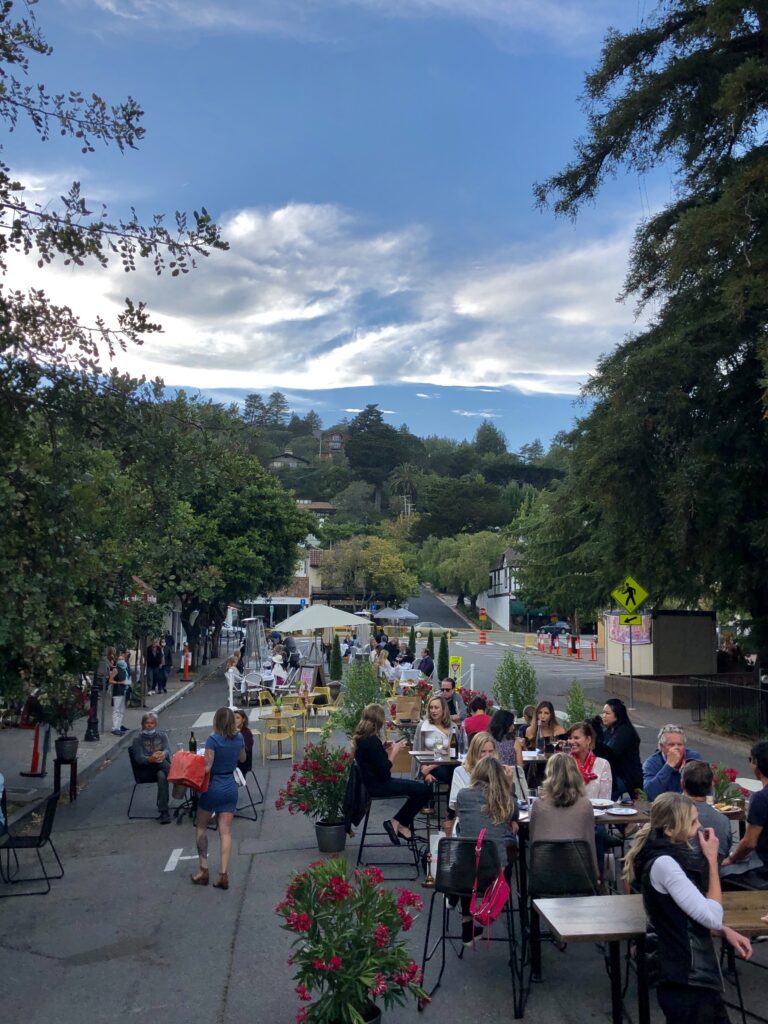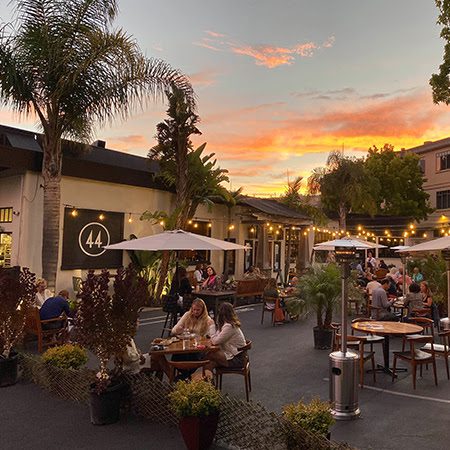Commissioners Seek Planning Resources to Dig Into a Long-Term Outdoor Program and Possible Recourse for Businesses on Private Property With Required On-Site Parking


“If we took this to a public vote, this would be a landslide.”
So said some of the residents who turned out Tuesday evening for the Mill Valley Planning Commission’s August 23rd hearing on issues related to the City Council’s unanimous decision in April to pare back some of the elements of our community’s incredibly popular use of outdoor space to eat, gather and enjoy the bounty of natural beauty around us.
As commissioners listened to streams of people speaking in opposition to the Council’s decision, the “landslide” statements seemed to catalyze an outpouring of support in the Council chambers in favor of a different approach by Mill Valley’s government. The days leading up to the hearing featured coverage by ABC7 News and hundreds of comments in support on various social media channels.
“Why are we limiting it to seasonal?” asked Ruby Unger of Bayview Avenue. “There are no seasons here, right? We sit outside (most months of the year). I’m personally annoyed by parking spaces, and I really enjoy sitting outside on patios.”
“You’ve got a stack of letters so thick in favor of outdoor dining in a community that (often) has no political engagement,” Lovell Ave. resident Nancy Rosen said. “Talk about vibrancy. Downtown has never been more vibrant.”
“Through this enormous loss, our restaurants became our shining stars that we all knew they were,” said Molly de Vries, longtime local resident and owner of the Non-Disposable Life retail shop at the Mill Valley Lumber Yard. “They went above and beyond through this tough time, and a little bit of magic came out. Our city gave me hope in humanity.”
“We’ve been given the opportunity to do something bold,” said former planning commissioner Kevin Skiles. “Our community has responded. What we need is for our government to respond. We need our government to respond. So far it has been tepid half measures. This is not the time for tepid half measures. This is an opportunity to completely rethink the way we use our downtown and the use of public space.”
“Every year, there are less and less people driving downtown to go to these shops and restaurants and they’re walking, riding bikes, e-bikes, pogo-sticks, whatever,” Skiles added. “We don’t have a parking problem. Look at how the business community has stepped up. Now we need to meet them halfway.”
As a reminder, here’s a brief summary of what the council voted for in April:
- Terminate the existing outdoor business use program effective Oct. 31, 2022, forcing the two businesses with parklets – Piazza D’Angelo and Equator Coffees – to take down their existing structures and re-apply well in advance of the June 2023 reopening of outdoor business use. Both have indicated that it is cost prohibitive to set up and take down through each phase of the program.
- Replace it with a seasonal program that runs from June to October, with all infrastructure related to outdoor business use required to be taken down each year. That would make Mill Valley the only Marin town with an outdoor dining program that is limited to a specific season.
- Prohibit all businesses using private property, with their owner’s consent, to use the private space if it reduces parking. This decision, which directly impacts Bungalow 44’s tent, TamalPie’s use of space adjacent to its covered dining patio, The Cantina’s use of a portion of its parking lot for outdoor seating and Gravity Tavern’s use of part of Miller Lane, provided no alternative recourse for businesses to explore alternative solutions, such as renting private parking elsewhere for customers, effectively shutting down outside dining long term for these businesses. Each of the aforementioned businesses could then only create outdoor dining by applying for space on city streets and going through the new program’s application process.
- The council’s April decision involved zoning code changes, it thus required the panel to go through the Planning Commission before heading to council for final adoption.
Through the course of the hearing Tuesday, the community fervor never let up in favor of a non-seasonal outdoor business use program that provided some recourse for businesses seeking a streamlined, clear process that included the costs associated with their use of public or private space.

Teresa Rea, a longtime land use planner and a member of the board of directors of the Mill Valley Chamber, backed Skiles’ recommendation that the Council extend the current Temporary Outdoor Business Use Ordinance for one year while “you do this important policy work and the community manages ongoing Covid challenges,”noting that no other city or town in Marin has adopted a “seasonal” outdoor program, as the Mill Valley City Council has proposed.
“It presents prohibitive annual capital and storage costs to businesses in a community that has demonstrated a strong interest in eating outside year round in a mild climate,” she added. “ This proposed ordinance offers no recourse to businesses with CUPs tied to parking, to explore alternative solutions, such as renting private parking elsewhere for customers. The ordinance will effectively shut down outside dining long term for these businesses.”
“We’re never getting back to normalcy,” Buena Vista Ave. resident Max Armour said. “For us to move forward as a community, we need to be able to congregate and be together. The era of the car as a central way of life is coming to an end.”
The vast majority of the testimony from attendees came from Mill Valley residents, though a few business owners chimed in.
“I’ve never been to a city meeting like this where there was not one negative comment,” Depot Cafe & Bookstore co-owner Paul Lazzareschi said.” I mean, it’s a slam dunk. You don’t have anything to think about.”
Jason Sims, general manager of Bungalow 44, told the commission that his team simply “wants to adapt this into something more permanent. If we had something year-round, we could commit and build something that isn’t temporary. Let’s move forward and not backward.” Bungalow 44 is among the businesses facing the predicament of not being able to use its outdoor dining area if it reduced parking.
Commissioner Jon Yolles noted that while the sentiment in the room was clear, he acknowledged that City of Mill Valley Planning Director Patrick Kelley was directed by the council to implement the Oct. 31st termination of any outdoor business space on private property that reduced the required parking associated with its conditional use permit.
“This is what was handed to staff by council,” Kelly said. “Council has been calling for this program. The policy decision ultimately comes down to the council.”
Kelley noted the seemingly complex road ahead for the businesses on private property with parking requirements related to their respective conditional use permits. For example, “we have a business that has a tent in a parking lot on private property, a business that has really enjoyed the benefits of the temporary outdoor business program.”
But Kelley also pointed to the possibility that Bungalow 44, Gravity Tavern, The Cantina and Tamalpie could possibly go through the design review process to obtain approval for outdoor dining, as Playa and the Sweetwater Music Hall have gone through in recent years.
“We have to strike some sort of balance on the risk of all of it going away,” Lich said. “I feel like this is an opportunity to be bold. If we were to recommend to the council that they would extend the current program and we’d then come up with a long-term plan and actually get resources from the Planning Department and we’d have the time to work on it.”
Macris noted the burden on planning staff because of the enormous increase in building permit applications related to the significant spike in housing requirements from the state. “There has not been a lot of time for staff or us to think about long-term issues,” he said. “Council would need to prioritize and provide resources.
At the conclusion of the hearing, Yolles proposed a motion recommending a one-year extension of the existing temporary outdoor business program, providing enough runway for city and business officials to explore what a right-sized outdoor business use program should look like in Mill Valley and providing a process for the private property businesses to have some recourse to address their parking limitations and/or go through the design review process for long-term outdoor dining. . Such an extension would hopefully allow for some additional planning resources to dig into the issues.
Yolles suggested a revival of the City’s Business Vitality Panel, which previously consisted of Mill Valley Chamber representatives and staff, city councilmembers and staff, including an expansion of it to incorporate commissioners and other stakeholders. “Let’s take a closer look at an updated parklet program along the lines of what San Francisco has that has some very clear guidelines,” he said.
“Either way the final action with the rests with the council,” Kelley said.

Sounds like they’re on the right track.
Hope they grant a permit to the Depot Cafe for amplified music. as well!